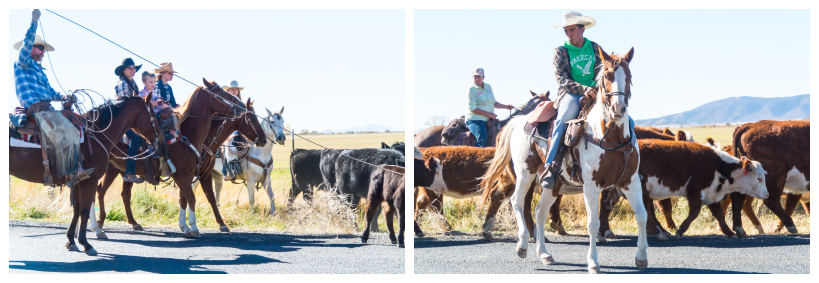
Yes, yes, believe it or not, they still herd cattle from horseback out in the western states. This particular herd was being driven from open grassland high in the Utah mountains east of Interstate 15 down to winter grazing and shelter west of Interstate 15. And, if you notice, the cattle and horses are on asphalt, along a roadway. In Utah, by law, cowboys and cowgirls driving herds of cattle from one pasture to another have the right of way along public roads. That is a legal accommodation, so as not to cross private property. In midwestern states, there is a similar legal accommodation for farm implements, e.g. tractors and combines, to be driven down public roads from one field to another during planting and harvesting season. No doubt, a similar legal accommodation exists in parts of Europe for the movement of sheep. Laws, such as the ones accommodating cattle, farm implements, and sheep, are forms of institution. Institutions are formalized agreements amongst a group of people, or between groups of people, that seek to accommodate the interests of all parties to the agreement. International treaties are institutions. Marriage agreements are institutions. Bills of sale are institutions. States and countries are institutions. Commercial companies are institutions. Non-profits are institutions. Holidays, birthday celebrations, memorials and commemorations are all institutions. Rules and laws are institutions. Institutions surround us and envelope us. Problems arise when we as individuals, or as members of a particular group, find ourselves subject to or obligated to institutions we, ourselves, played no part in formulating. Bewilderment sets in, followed shortly by anger, and then obstinacy and recalcitrance. A labor strike is a perfect example of alienating bewilderment leading to anger, then obstinacy and recalcitrance. And maybe so too are mass shootings and bombings. Bullying, legal, physical, or psychological, though often employed, is not a useful remedy for obstinacy and recalcitrance prompted by alienation from the functioning of an institution. Renegotiation or picking up and moving on to something else are really the only practical remedies for the failing of an institution to address one’s personal interests. Without buy-in by all parties involved, buy-in that respects and substantively addresses all individual interests, no institution has much of a future beyond the immediate. Corrosion from beneath and from around its edges by those who do not buy-in to its functioning will severely limit its life span and its effectiveness at achieving any particular goals it sets for itself. Process is something we all understand when it comes to achieving goals, goals like moving cattle from one pasture to another. We know it requires rising early, saddling our horse, and meeting up with our crew. We know it requires patience and understanding of how cattle think, get spooked or not, and forever desire to edge toward tastier and tastier munchies. Spook them or frustrate that desire and they will not cooperate with any plan to move them. Bully them and they will rebel, with injury or even death the result. But, what do most of us really understand about process when it comes to establishing and maintaining an institution? By evidence around us, apparently, not much. Workers sign up for jobs by giving away privacy and freedom and almost all opportunity to participate in the goals and strategic decision making of the institution for which they are now employed. In most cases, contract for employment is an explicit agreement to become subservient to a separate class of people, managers and investors of the company. Even outside of work and on personal time, workers divest themselves of opportunity to control the company they work for, along with its managing elite, by not running for elected office, not voting, and not actively lobbying those who profess to represent us within the halls of government. Instead, we spend our free time listening to talk-radio and TV and Internet hucksters attempting to sell us on one vacuous bill of goods after another. Where is sitting down with one’s neighbors and discussing the needs of our communities and any ideas we may have for filling those needs? Where is the process by which new more equitable, profitable, effective, and fulfilling institutions are formed and maintained? Where is the process by which managing elites come face to face with non-elites for the purposes of creating a society in which we all profit without unequal exploitation? And where are the processes by which we reassess the need for existing institutions, renegotiate and reconstitute them, or put them to rest? We live in a world right now where money, with all its utility, is being sucked from each of us at an alarming rate. The latest GOP tax bill is yet another attempted “improvement” on that sucking machine, a sucking machine that benefits mostly elites. But, be aware. There is another form of utility at our disposal. And that, is contract and agreement amongst people, amongst regular citizens. When people get together, respecting and appreciating of each other’s interests, there is little they cannot achieve, even the throttling of that overshadowing elite-benefitting-only sucking machine. Talk to your neighbors. Put your heads together. Share your thoughts. Hash out a plan that will equitably benefit everyone. And then, religiously go through the process of bringing those plans to fruition. Your life will be much richer in friendships and community for having done so. |
• Posted: Nov 29, 2017 10:50:33
• Comments Welcome
• Vote CoolPhotoblogs
• Purchase a Print
• Share
Monday, October 23rd, 2017 Parowan UT USA |